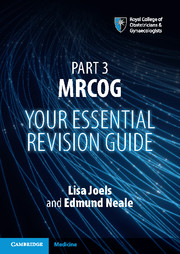Book contents
- Frontmatter
- Contents
- Foreword
- 1 The Part 3 Clinical Assessment in the Context of the MRCOG Examination
- 2 Core Clinical Skills
- 3 The Modules of the Curriculum Assessed in the Part 3 Exam
- 4 Tips for Candidates
- 5 Practice Tasks with Videos
- 6 Revision Resources
- Appendix 1 Part 3 MRCOG Clinical Skills Assessment Template
- Index
Foreword
Published online by Cambridge University Press: 05 September 2016
- Frontmatter
- Contents
- Foreword
- 1 The Part 3 Clinical Assessment in the Context of the MRCOG Examination
- 2 Core Clinical Skills
- 3 The Modules of the Curriculum Assessed in the Part 3 Exam
- 4 Tips for Candidates
- 5 Practice Tasks with Videos
- 6 Revision Resources
- Appendix 1 Part 3 MRCOG Clinical Skills Assessment Template
- Index
Summary
Membership of the Royal College of Obstetricians and Gynaecologists (RCOG) is recognised worldwide as certifying a high standard of clinical skills, and carries significant prestige. The MRCOG examination is an exacting test of those clinical skills comprising three parts. In each part of the exam applied clinical knowledge is assessed and a sound understanding of the evidence base underpinning the practice of obstetrics and gynaecology is essential. Clinical practice involves face-to-face contact with patients, and therefore the ability to demonstrate knowledge and skills in real-life encounters is fundamental to working as an obstetrician and gynaecologist.
Practising obstetrics and gynaecology to a high standard is not just about knowledge, however. Our mothers and patients can be well informed and often wish to be involved in making decisions about the care they and their babies receive, so the good obstetrician and gynaecologist will also have good communication skills, while keeping the safety of patients at the forefront of their minds.
As experienced teachers and examiners, we have seen able doctors fail the clinical assessment, not because of a lack of knowledge, but due to poor exam technique, failure to understand the skills being tested and by making simple errors. We hope that this book and its linked video resources will give you the chance to practise the skills needed to demonstrate in the exam setting the skills that you routinely use every day. We also hope that the detailed discussions of the marking schemes will show you how to pass each task in the Part 3 exam.
We couldn't have prepared this revision resource without the help of a large team. We'd like to thank Chris Chivers, Head of Examinations, who has provided editorial input and detailed advice about the style and structure of the book. Karen Penfold has contributed to the typing of large sections of the book in addition to helping with many other RCOG activities over a long period of time.
We'd like to thank the team who helped create the video resources. Christine Tang, Part 3 MRCOG Administrator, and Helen Munn, eLearning Manager, organised and managed the filming of the video resources with precision and patience. Colin Duncan, Paul Mills and Lesley Briggs brought their experience of being involved as examiners to the simulated tasks and in providing detailed examiner's comments for the book, which give an important insight as to how examiners make their judgements.
- Type
- Chapter
- Information
- Part 3 MRCOGYour Essential Revision Guide, pp. ix - xPublisher: Cambridge University PressPrint publication year: 2016



